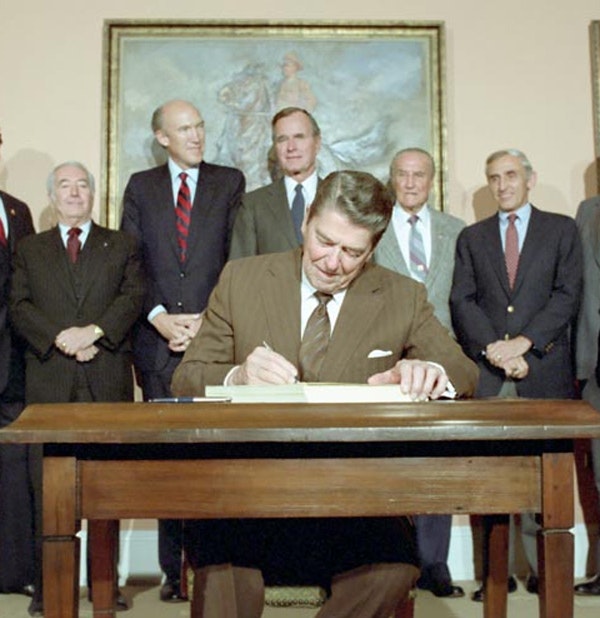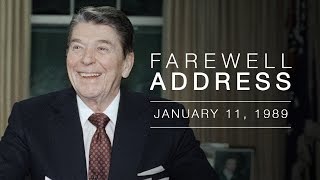Recovering Our Common Purpose
Creating a common purpose amid so much acrimony, and fashioning a shared purpose in a diverse society, is arguably our greatest national challenge.
 President Ronald Reagan delivers his 34th and final televised speech to the nation from the Oval Office, January, 11, 1989.
President Ronald Reagan delivers his 34th and final televised speech to the nation from the Oval Office, January, 11, 1989.
Twenty-nine years ago this month, Ronald Reagan finished his second term as President of the United States. In his final address from the Oval Office, he explained his sense of America as “a shining city upon a hill.” Amid division and distrust in the country today, does Reagan’s vision of a country that stands for freedom, open doors, and free markets offer clues for revitalizing a sense of common purpose as a nation today? The answer is yes.
On January 11, 1989, Ronald Reagan made his 34th and last address from the Oval Office. He wore a navy suit, dark-patterned tie, and crisp white shirt. A cup of pencils and pens sat on the desk to his left. Family photos adorned the credenza behind him.
Reagan’s goal that evening was simple: to connect with his fellow Americans and share a few thoughts, some of which he had been “saving for a long time.” One of these was his view of the United States as a “shining city upon a hill.” Reagan used his vision of that city to remind Americans of our common values.
Reagan used his vision of that city to remind Americans of our common values.
John Winthrop, the Puritan Pilgrim, takes credit for the earliest use of the phrase “city upon a hill” in the American context. In 1630, during the long journey of the ship Arabella bound for Salem Harbor in pursuit of religious freedom, Winthrop extolled qualities like justice, humility, patience, and community that he believed should mark the Puritans’ service of God in the New World. “For we must consider that we shall be as a city upon a hill. The eyes of all people are upon us,” he preached.
Reagan took inspiration from Winthrop and frequently made the words “city upon a hill” his own. For a Generation Xer like me, Reagan’s frequent invocation, but particularly in this parting address, had profound impact as I searched for a spot on the political spectrum in the late 1980s and landed somewhere just right of center. For others, it was just to the left. In the middle was common ground.
More than 18 minutes into his 21-minute speech, Reagan admitted thinking about these words a lot during the waning days of his presidency and wondering if he had “ever quite communicated” what he meant. So he seized the moment here:
[I]n my mind, it was a tall proud city built on rocks stronger than oceans, windswept, God blessed, and teeming with people of all kinds living in harmony and peace — a city with free ports that hummed with commerce and creativity, and if there had to be city walls, the walls had doors, and the doors were open to anyone with the will and the heart to get here. That’s how I saw it, and see it still.

If you break it down, this passage is consistent with the kinds of principles and policies that we could stand to reaffirm today.
Built on rocks, God blessed. Reagan believed national pride and patriotism were important but should be thoughtful and informed. For him, you could be confident in knowing that America is special, even exceptional, and built on a firm foundation of freedom.
Reagan believed national pride and patriotism were important but should be thoughtful and informed.
Yet you also should be humble enough to know that our freedom is fragile and not to be taken for granted. Families, schools, and communities have a responsibility, Reagan believed, to ensure that all young people know “America is freedom.” The way to get there, he implored, was to teach history better and foster civic engagement.
Humming with commerce and creativity. Reagan believed in American global leadership, both political and economic. For him, you could actively engage in markets abroad and protect the needs of small business and working-class Americans at home. The two were not mutually exclusive, as they sometimes are viewed today.

Reagan’s support for “free and fair trade” may help explain how he was able to champion the Uruguay Round of trade talks in 1986 (which led to the creation of the World Trade Organization) and the U.S.-Canada Free Trade Agreement in 1988 (which eventually became the North American Free Trade Agreement), while at the same time supporting retraining for workers affected by changes in the global economy and occasional restraints on imports.
He didn’t champion protectionism for protectionism’s sake, though. “In trying to help workers in ailing industries,” Reagan said in a 1986 radio address, “we must be careful that the cure is not worse than the disease.”
Open doors, people of all kinds. Reagan believed that America must remain “a beacon…for all the Pilgrims from all the lost places who are hurtling through the darkness.” His goal, articulated early in his presidency, was a policy that is “fair to our own citizens while it opens the door of opportunity for those who seek a new life in America.”
Reagan believed that America must remain “a beacon…for all the Pilgrims from all the lost places who are hurtling through the darkness.”
Reagan kept the door open for refugees and asylum seekers from places like Vietnam, Cuba, and the Soviet Union. In 1986 he also signed into law immigration reform that is most famously remembered (or infamously, in the view of many) for extending legal status to more than 2 million undocumented migrants. While the impact has been decidedly mixed, the law’s passage was a bipartisan accomplishment—something too often lacking in Congress today.
 President Reagan in the Roosevelt Room signing S. 1200, the Immigration Reform and Control Act of 1986, November 6, 1986. (Ronald Reagan Presidential Library and Museum)
President Reagan in the Roosevelt Room signing S. 1200, the Immigration Reform and Control Act of 1986, November 6, 1986. (Ronald Reagan Presidential Library and Museum)
These three principles begin to offer a way of forging the unity that so many of us desire. Our national motto, e pluribus unum, translates into “one out of many.” A full embrace of these values would help us remain a diverse people with a common purpose.
Our national motto, e pluribus unum, translates into “one out of many.” A full embrace of these values would help us remain a diverse people with a common purpose.
Polls showed Reagan was always “well-liked by the American public.” But his appeal was more than that. He used the values of Winthrop’s “shining city on a hill” to describe an America in which broad sectors of society could find themselves. He pursued policies that broadened prosperity, accelerated Communism’s collapse, and rallied voters of all kinds to his support. Young and old, white collar and blue collar, Republican and Democrat.
For Reagan, I think the “shining city upon a hill” meant a nation that was both confident and humble, capitalist and compassionate, principled but able to compromise, both embracing of our diversity and remaining true to the universal foundation of freedom that has bound us together in this democracy project for more than 240 years. All qualities that are under stress in our political system today.
Besides Winthrop, Reagan may be the single American most associated with the “city upon a hill” phrase. But the fact that Republicans and Democrats, presidents and non-presidents alike, have all found inspiration in a phrase first uttered on a ship bound for the New World nearly 400 years ago reinforces that we’ve always had common purpose as a nation.
At times we have faltered in its pursuit and needed a call to action to get us on track. Now is one of them. These words helped found a nation. They can help us reaffirm our nation again and again.
The Catalyst believes that ideas matter. We aim to stimulate debate on the most important issues of the day, featuring a range of arguments that are constructive, high-minded, and share our core values of freedom, opportunity, accountability, and compassion. To that end, we seek out ideas that may challenge us, and the authors’ views presented here are their own; The Catalyst does not endorse any particular policy, politician, or party.
-
Previous Article Congressional Perspective: The Timing is Right for Immigration Reform An Interview with Rep. Lamar Smith (R-Texas)
-
Next Article We Are America A Conversation with Ruben Navarrette, Syndicated Columnist and Bush Institute Education Reform Fellow, and Reverend Samuel Rodriguez, National Hispanic Christian Leadership Conference President

